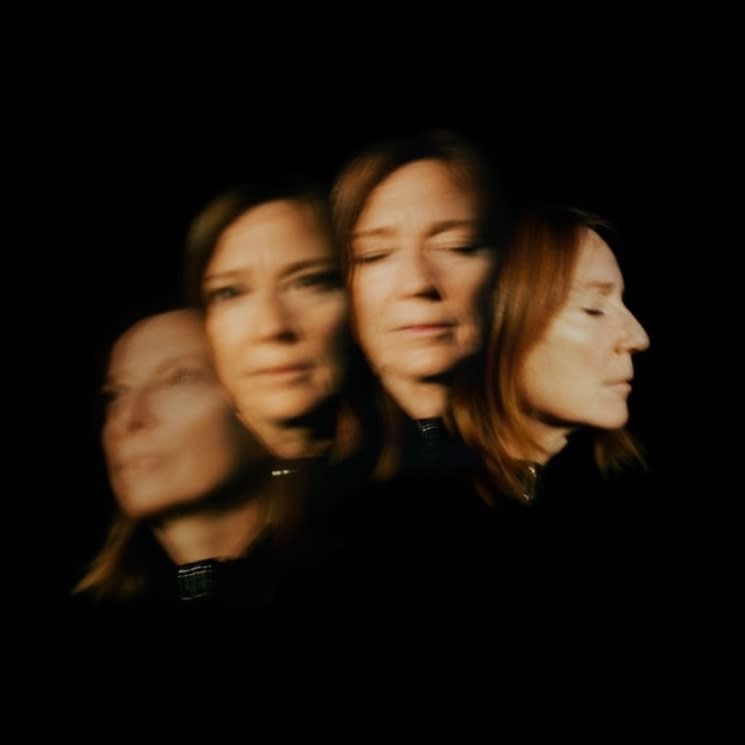Beth Gibbons is like a ghost. Probing the shadowy spaces of bereavement, her songs are articulated through weary quivers, moans and wails. They convey fractured feelings and inhabit dislocation itself, approaching the remaining space as terrain to be mapped, felt through, revisited, grown with.
Her voice first materialized thirty years ago within the claustrophobic urban loneliness of Portishead's technologically haunted landscapes, but today she visits upon us with her solo debut. Oriented from another position of liminal removal, Lives Outgrown is distanced from those breakbeatnik biddings, opening instead on a folksy fingerpicked acoustic guitar.
Suggesting a dwelling in lives lived, developed beyond, separate enough to look back on with hindsight — habits actively abandoned or simply forgotten to time —Gibbons invites listeners into her sorrows with hushed, semi-cryptic confessions as the quiet rumble of former Talk Talk drummer Lee Harris's tom and bass drums (ever-present throughout the album) conjures an enchanted campfire closeness and a bass clarinet adds a sour backdrop to the drama.
These are decidedly intimate songs approached from remarkably wide angles, woodsy tapestries penetrated with modernist psychedelic touches (whirly tubes, piano strings struck with metal spoons), artfully woven into grand, sprawling arrangements that will reward repeated private listening perhaps even more than Portishead has.
The messages in Gibbons's songs compliment the widescreen instrumentation with elliptical impressionism that seems trapped outside past, present and future, weighing it all from some temporally tormented bird's-eye view. A distinctly visual lyricist, Gibbons conjures a number of images to convey the large expanses she's inhabiting in these songs, careful to anchor her (inter)personal dramas to a larger universe of connection. The tracklist transports listeners to "Oceans" and reaches "Beyond the Sun"; on "Burden of Life" Gibbons relates our passage through time to the passive experience of being weathered "Like pebbles on the shore"; on "Rewind" she sings about occupying a place between the present and somewhere "too far to rewind" to.
Lead single "Floating on a Moment" feels out an existence untethered by loss, the bass guitar loping and slinking with an arrhythmic vigilance like the characters traveling the desert vistas of Arrakis. When she reaches the song's conclusion, Gibbons chews on it like she's still digesting the thought, the aphorism, "All we have is the here and now" not so much delivered as it is regurgitated, the pain of a severed past and resignation to a lost future lingering in the pit of her stomach.
If undeniably sentimental — whimsical even — the perspective suggested in some of these tracks can articulate a harsh fatalism, articulating what's gone through decidedly final processes of division.
"Reaching Out" reframes the journey from one of alienation and reduction to a positive project, effectively deepening and sweetening the meaning of the "lost" connections explored elsewhere. Containing echoes of the album's title in that of its own, the track suggests expansion, multiplication, new connection, pursuing channels — outgrowth. As Gibbons entreats a loved one to consider the distance they're surrounding themselves with, elements of the track's instrumentation (Harris's tumbling drum roll, tremolo guitars, spy thriller strings, Gibbons herself affecting murmured, phantasmic asides along the quiet conviction that guides the track) build until bombastic horns and cymbal crashes enter the scene, leaning into a mounting dynamism that suggests growth occurring on an exponential scale.
Still, it isn't until the album's finale that Gibbons herself seems content with the message that closes the album's first single, singing about the world immediately before her as if her misgivings about things lost are resolved, and coexistence with their memory can be enough: "Oh whispering love / Blow through my heart / When you can." It's a decidedly daylit and pastoral entry, full of hope, but there's also tension riding on Harris's drum skins and the hinge-like squeak of an extended percussion technique that pierces the still environment with mechanical intervention.
The road forward won't be found on any clear path, but Lives Outgrown reminds us that the ghosts haunting us will continue to reside in the spaces of this reckoning, ready to emerge and help us in surprising ways.
